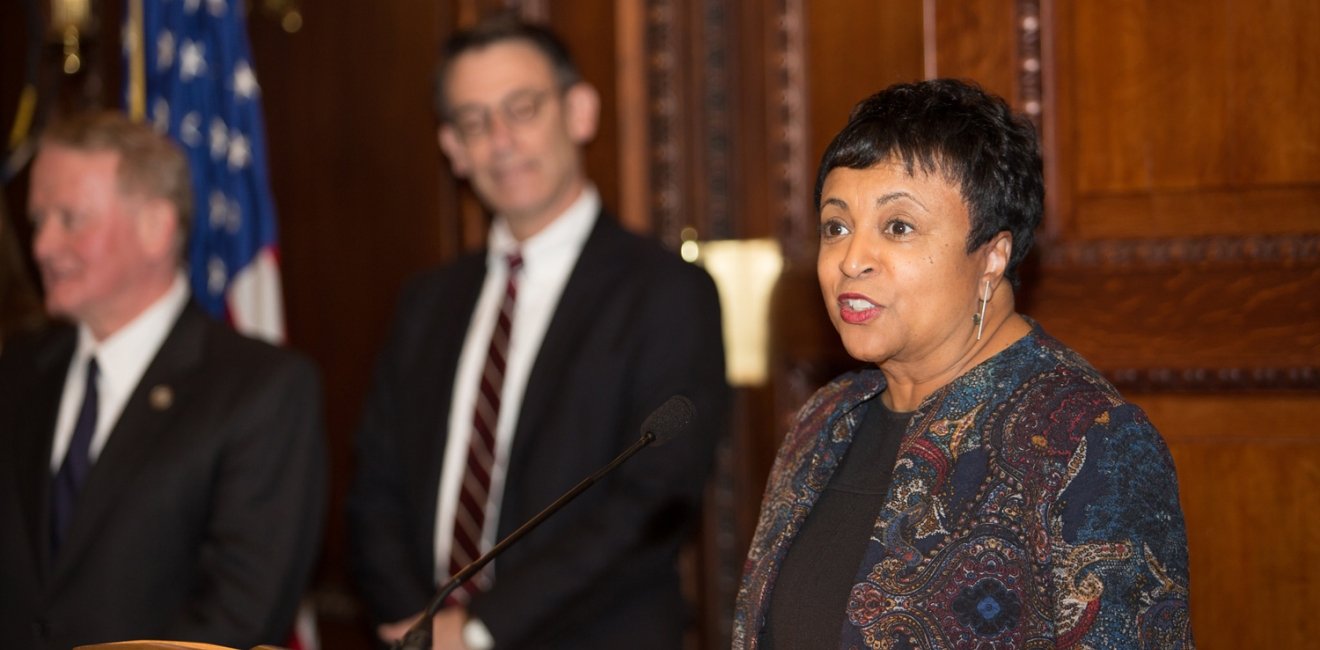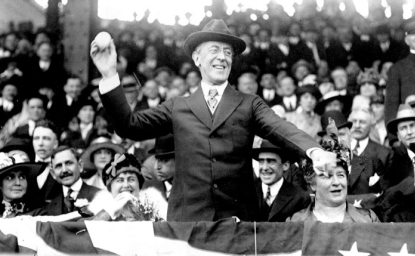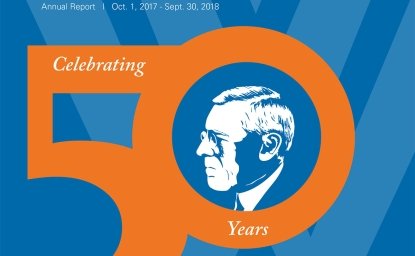
[[{"fid":"115646","view_mode":"default","fields":{"field_file_image_alt_text[und][0][value]":"Carla Hayden at the Wilson Center Announcing the New Digital Collection of Woodrow Wilson's Papers","field_file_image_title_text[und][0][value]":"","field_file_source[und][0][value]":"Librarian of Congress Carla Hayden at the Wilson Center Announcing the Newly Digitized Woodrow Wilson Archive","field_file_caption[und][0][value]":""},"type":"media","attributes":{"alt":"Carla Hayden at the Wilson Center Announcing the New Digital Collection of Woodrow Wilson's Papers","class":"media-element file-default"}}]]
Q: How did the library acquire President Wilson’s papers?
A: We were very fortunate to have acquired the papers of President Woodrow Wilson through both gifts and purchases. Edith Wilson, the president’s wife, deposited most of the materials at the Library of Congress after Ray Stannard Baker, Wilson’s authorized biographer, wrote his multivolume biography. The bulk of the papers arrived at the Library in 1939, and this included most of Wilson’s presidential papers. Edith Wilson made them a permanent gift in 1954. Additional documents have been added over time.
Q: Why did you choose to digitize them now?
A: We are working to digitize some of our most important and historical collections, and we especially want to make presidential papers available online. The Library of Congress holds the papers of 23 presidents, so we want to make them as accessible as possible for students and scholars.
This collection is also coming online at a timely moment – 100 years after Wilson’s presidency and after World War I. Coincidentally, we have a large exhibition about World War I on view now at the Library through January 2019, and some of Wilson’s papers are featured in the exhibition. It’s called “Echoes of the Great War: American Experiences of World War I.”
Q: Who is the primary audience for the documents and do you expect a lot of interest from historians?
A: President Woodrow Wilson’s legacy continues to be the subject of much debate. He is a complicated figure in American history. We believe that making these primary-source materials available to everyone online means that scholars and young students can do their own research, learn more about Wilson and form their own opinions.
We hope the Library’s digitized collections, from Alexander Hamilton to Woodrow Wilson to Susan B. Anthony and Elizabeth Cady Stanton will inspire people to learn more about American history.
Q: Describe one piece from the collection that stands out and why it is unusual or important.
A: President Wilson was instrumental in creating the League of Nations, the world’s first global forum for diplomacy. He was seeking to transform international politics and saw the world as interconnected as he forged a peace settlement after World War I. In the collection, we have Wilson’s draft of the original draft of the covenant for the League of Nations. This would define the body’s purpose and structure. This is a special document that speaks to Wilson’s legacy on the international stage.
There are also some fascinating items in the collection relating to the peace process to end World War I, including materials documenting the Paris Peace Conference and a map of the Middle East with proposed new borders after World War I.
[[{"fid":"129526","view_mode":"default","fields":{"field_file_image_alt_text[und][0][value]":"Image 31 of Woodrow Wilson Papers: Series 1: Diaries and Diary Material, 1876-1924; Diaries, 1876-1904","field_file_image_title_text[und][0][value]":"","field_file_source[und][0][value]":"Image 31 of Woodrow Wilson Papers: Series 1: Diaries and Diary Material, 1876-1924; Diaries, 1876-1904","field_file_caption[und][0][value]":""},"type":"media","attributes":{"alt":"Image 31 of Woodrow Wilson Papers: Series 1: Diaries and Diary Material, 1876-1924; Diaries, 1876-1904","class":"media-element file-default"}}]]
Q: Do we learn anything new about President Wilson personally from these documents?
A: We’re often asked what new discoveries can be made from a collection like this. In the case of Wilson, many of his papers have been published in the past, and many books have been written on his presidency. But beyond that, the collection includes extensive correspondence between Woodrow Wilson and Edith Wilson that reflects their personal relationship. In one love letter from 1915, Wilson addresses the letter to “my precious darling,” and he writes about Edith’s “sweet spirit.” Historians looking at this collection will be able to see their close relationship.
Q: How does this collection compare to other presidential collections in the library... more or less extensive?
A: President Wilson’s papers prove to be an expansive collection. This is one of the largest presidential collections held by the Library of Congress. It consists of about 280,000 documents. The size of this collection, in part, reflects the time when these papers were created. The advent of the typewriter dramatically expanded the number of documents the White House produced. And this was also a time when the scope of the federal government was growing, and Wilson was strengthening the presidency.
Q: Why is it so important to digitize historical records like this?
A: It’s important for all of us to know about our history, and these are the primary sources of history. These are the documents that researchers and authors use to write books and make films. Collections like this form a substantial portion of our knowledge of figures like Wilson. So digitizing these historical records will make them accessible to more and more people. And more students who are the historians of the future can learn to research with primary sources.
Q: Who or what is next up for the Library’s digitization efforts?
A: The Library’s collections are vast, so we are constantly working to digitize these records. Recent collections that have gone online include the papers of Benjamin Franklin, President James Buchanan, baseball scout Branch Rickey, and suffragists Susan B. Anthony and Elizabeth Cady Stanton. So stay tuned for more!
Contributor
Explore More
Browse Insights & Analysis
Digitized Archive on 28th President is Unveiled at Wilson Center

Woodrow Wilson Papers at the Library of Congress

